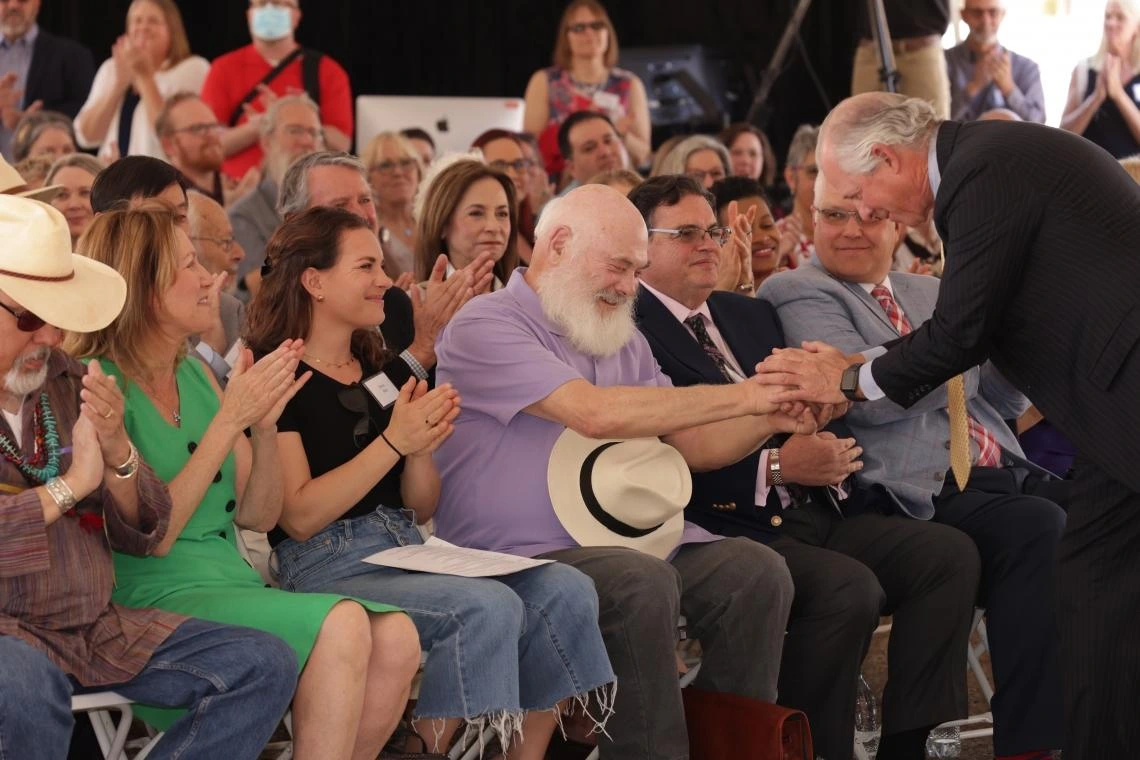Construction scheduled to begin on new home for Andrew Weil Center for Integrative Medicine
The $23 million, donor-funded project will provide new space for the internationally recognized UArizona center, which focuses on whole-person wellness.

The University of Arizona and UArizona Health Sciences announced Wednesday the completion of a $23 million fundraising effort to build a new home for the Andrew Weil Center for Integrative Medicine, part of the College of Medicine – Tucson.
The 30,000-square-foot facility will be located on the UArizona Health Sciences campus at 1231 N. Cherry Ave. Construction is expected to begin mid-May and be completed in fall 2023.
"Dr. Weil and the University of Arizona made medical history back in 1994 when he established the world's first program in integrative medicine," University of Arizona President Robert C. Robbins told attendees at a ceremonial groundbreaking Wednesday. "Now, the Andrew Weil Center for Integrative Medicine will have a home worthy of the center's reputation for excellence, while helping advance the university's Grand Challenges strategic plan pillar. I am grateful for the many donors who came together in support of this project."
Iris Cantor and the Iris & B. Gerald Cantor Foundation jointly made a lead commitment of $5 million to support the project. In recognition of their support, one of the facility's three buildings will be named the Iris Cantor Building. Since 1978, the Iris & B. Gerald Cantor Foundation has been a force in cultural philanthropy, medical research and health care. Its vision, as Cantor says, is "to support the body and the soul."
Additional leading gift commitments to the project include $1 million from the Diamond Family Foundation, $1 million from Humberto and Czarina Lopez and $1 million from the Norma Lollar Family. Karen and Stephen Malkin and family committed $250,000 to the project, and many smaller donations contributed to the total amount raised.
"I have long dreamed of having a physical home for our center," said Dr. Andrew Weil, founder and director of the Andrew Weil Center for Integrative Medicine. "Now, we are breaking ground for it. The building design draws on the principles of integrative medicine and will represent that field to the university, the community and the world."
The center, which currently has offices at off-campus health sciences facilities, is internationally recognized for its evidence-based clinical practice, innovative educational programs and research that substantiates the field of integrative medicine and influences public policy. The center partners with more than 100 residency programs and has welcomed thousands of physicians from all over the world since its creation in 1994. Professionals trained at the center are now guiding more than 10 million patients to take a greater role in their health and healing.
"As one of the leading academic medical centers in the southwestern United States, the University of Arizona Health Sciences is deeply committed to the principle that health care should take an inclusive approach to serve the needs of the whole person," said Dr. Michael D. Dake, senior vice president for UArizona Health Sciences. "Dr. Weil has long been one of the leading lights in doing just that, and this new center will advance care that considers and incorporates the holistic needs of every individual patient."
Buildings designed to represent mind, body and spirit
The new facility will include three buildings surrounded by desert gardens and linked by a series of pathways. It was designed to embody the center's ethos of whole-person wellness and the principles of integrative health. Each building will represent an aspect of the whole person: mind, body and spirit.
The center's administrative functions will take place in the "mind" building, while education and wellness activities for health care professionals and the public will take place in the "body" building. The "spirit" building will provide a tranquil environment for nondenominational spiritual engagement and meditation.
"These buildings will manifest integrative medicine principles as health-promoting workspaces," said Dr. Victoria Maizes, the center's executive director. "They will serve the center as teaching and research sites and offer innovative programming to the community."
The three buildings were thoughtfully designed to support integrative health, with particular attention given to exercise and movement, social relationships, spirituality, healthy nutrition, sleep quality, stress reduction and resilience. Wellness-promoting building features will include everything from nontoxic building materials and sound-absorbing surfaces to windows that allow abundant natural light.
In addition to being a place for learning, the new home for the Andrew Weil Center for Integrative Medicine will serve as a "living lab" for collaborative research in integrative medicine, including the testing and development of new building systems and technologies focused on place and well-being.
"When I left the National Institutes of Health to join the AWCIM, my dream was to link the AWCIM, the College of Medicine – Tucson, and the College of Architecture, Planning and Landscape Architecture to carry out research and instantiate well-being in the built environment," said Dr. Esther Sternberg, director of research for the Andrew Weil Center for Integrative Medicine. "It is exciting to see these two sides of my life's work come together in this building complex: the research on the science of the mind-body connection, and the impact of the built environment on health."
Line and Space LLC of Tucson designed the new facility. The firm has worked on multiple projects at the university, including the Poetry Center. DPR Construction is the construction firm for the project.

